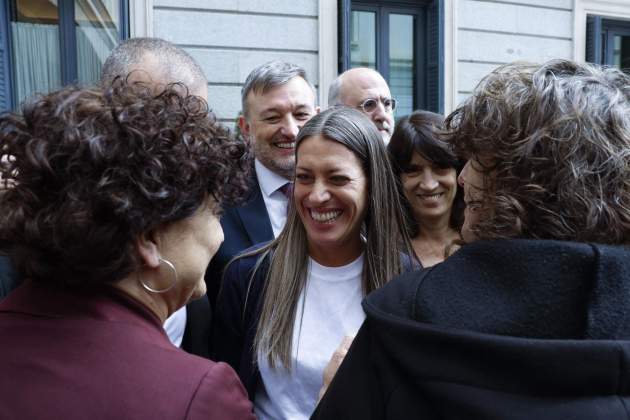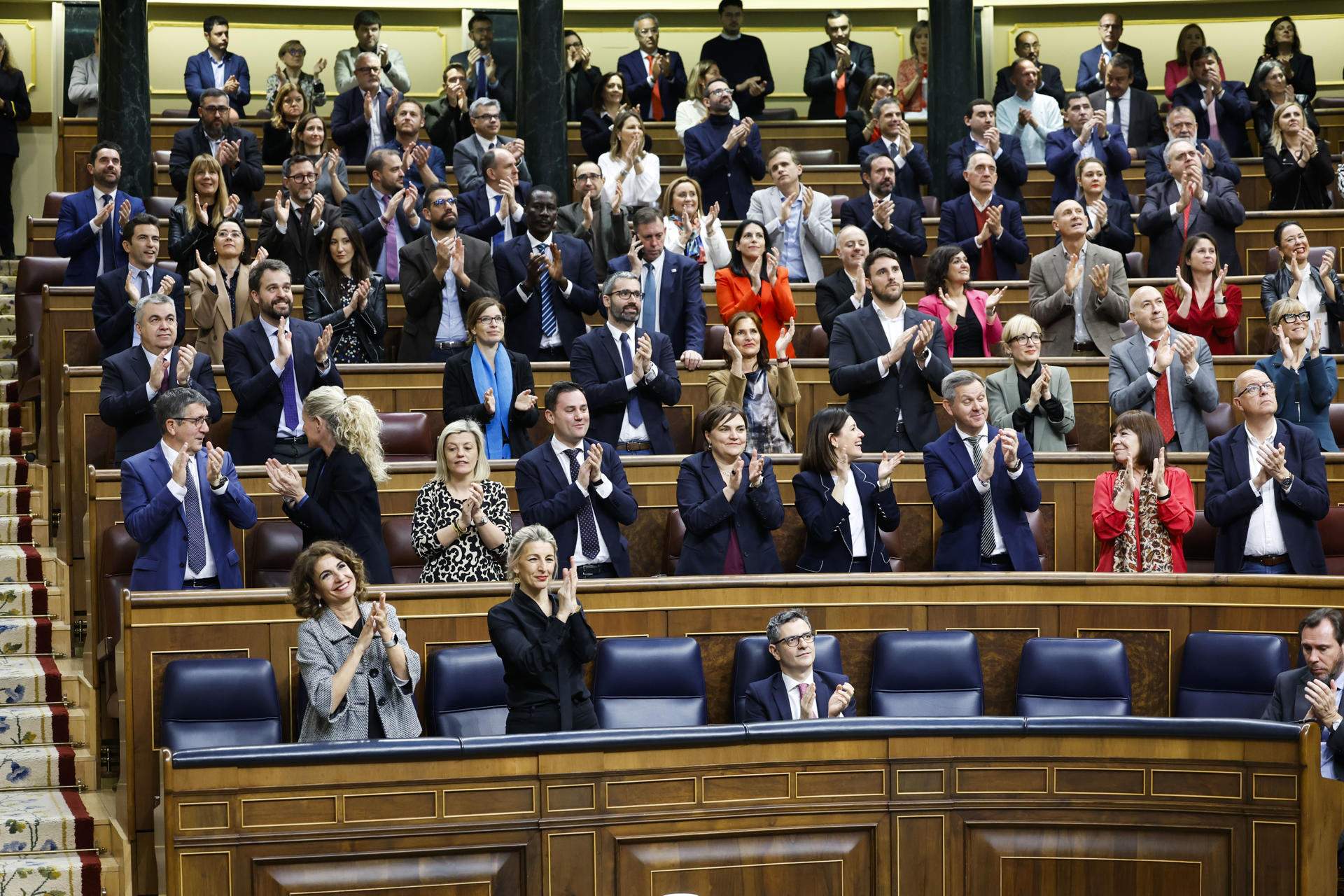Spain's lawmakers have given the definitive "yes" to the amnesty law. The Congress of Deputies, which has the last word on legislative initiatives, has given the green light to the revised text agreed on by the Socialists (PSOE), Together for Catalonia (Junts) and the Catalan Republican Left (ERC) that frames offences of terrorism in a European definition, and refers to high treason in terms of a UN General Assembly resolution. Thus, the measure intended to bring to an end prosecutions linked to the Catalan independence process has been passed in the lower house by 178 votes to 172. As expected, it was supported by the PSOE, Sumar, ERC, Junts, the PNV, Bildu, Podemos, the BNG and the now-unaffiliated MP José Luis Ábalos, and opposed by the PP, Vox, the Canarian Coalition and UPN. Next, the law will travel to the Senate, where it will undergo a two-month legislative haranguing, as the PP-led upper house seeks to paralyze it. However, given the primacy of the lower house in Spain's system, the amnesty bill cannot be ultimately stopped by the Senate, and at the end of May it will return to Congress, whereupon any changes introduced by the upper house will almost certainly be reversed and the final seal will be given. It will then be published in the official gazette, enter into force and the judges will have two months to apply it.
This Thursday's debate had little mystery. The unknowns were resolved last week: the amendments agreed between the Socialists and the two Catalan pro-independence parties refined the wording regarding the offences of terrorism, treason and misuse of public funds and resolved the reluctance expressed by Junts at the end of January. At that time, the Catalan party halted the amnesty bill's legislative journey, arguing that the draft had "loopholes" which "abusive Spanish justice" could use to turn it into "waste paper". This Thursday's vote comes the day after the calling of a snap election in Catalonia for May 12th and, in fact, the legislation has consequences for the elections: the future of president-in-exile Carles Puigdemont, who has already raised the possibility of becoming the Junts candidate in May, depends on the measure. The judges, who have two months to apply the amnesty from when it comes into force, are expected to start doing so at the end of May, meaning that the timeline that might enable Puigdemont to appear in a hypothetical investiture debate is very fine: the possible dates on which Catalan MPs would have to invest a new president of the Generalitat of Catalonia fall in the same weeks as when Spanish judges will be required to end their judicial pursuit of alleged pro-independence offences.
Junts and ERC: after the amnesty, the next step is the referendum
During the debate in Congress, the two pro-independence parties made it clear that, with the passing of the amnesty law, nothing comes to end in terms of their political ambitions. On the contrary: the law that ends the judicial persecution of Catalan independentism is an impulse to address the political conflict on equal terms. From Junts, Josep Maria Cervera sent a message to justice minister Félix Bolaños and all those who, like the PSOE politician, want to "turn the page". Cervera argued that "the only page that will turn is that of repression and of injustice", given that the amnesty "only returns to politics what belongs to politics" and "opens a window of opportunity to negotiate the future of Catalonia on equal terms".
On behalf of the Republican Left, Pilar Vallugera asserted that the amnesty law "is not enough" and reiterated that the solution to the political conflict between Catalonia and Spain requires the holding of a self-determination referendum. The ERC deputy also emphasized that the law "was made for those who went to the airport, not just for party leaders" - in reference to the thousands who protested at Barcelona-El Prat Airport on October 14th, 2019 when nine pro-independence leaders were found guilty of sedition.

The PP and the PSOE face off over the aims and spirit of the amnesty
During his speaking turn, the leader of the People's Party (PP), Alberto Núñez Feijóo, described the amnesty as "submission" and reproached the PSOE for not calling things by their name: "Don't come to us with coexistence because you are crushing the rights of majorities, don't come to us with justice because you want to avoid it and don't come to us with democracy because you are liquidating the separation of powers", he proclaimed from the lectern. Likewise, he warned Pedro Sánchez that the Catalan election "will mark the beginning of the end" of his government, since once Sánchez "ceases to be useful" to the pro-independence parties "they will let him fall".
On the other hand, the PSOE spokesperson in Congress, Patxi López, claimed that the Socialists have "rolled up their sleeves" to manage the "failure" of the PP over the Catalan issue, since the party of the Spanish right, then in government, responded to the independence process with an "absence of politics" and "took refuge behind the courts and the Penal Code" over the political conflict: "We had the obligation to fix what you damaged", he said. Now, the amnesty law has given rise to "courageous" politics, "much attacked" by the opposition, and despite that fact, López is convinced that the PP will accept it in a few years: "Far from breaking up Spain, we are uniting and strengthening it with our policies", he asserted.
The path ahead: in force at the end of May?
With Congress having given the green light to the amnesty, the bill now continues its journey, entering the Senate. The PP, with an absolute majority in the upper house, will be able retain it there for two months after carrying out a reform of dubious constitutionality on Senate regulations. The senators of the right-wing majority will be able to reject the law or empty all of its articles, but Congress will always have the last word. However, the lower house will no longer be able to modify the wording beyond reverting to the current text. The forecast is that on Tuesday, March 19th, the procedural Bureau of the Senate will process the bill and start counting down the clock. That would keep the bill in upper-house hands until mid-May with Congress putting the final stamp on it on May 23rd or 30th. From there, the law itself sets a deadline of two months for the judges to apply it.
From November 13th to March 14th
The first draft text of the amnesty bill arrived at the Congress of Deputies on November 13th, 2023, with the PSOE registering the first version alone, after negotiating with ERC and Junts separately. Two weeks later, Congress voted to allow Pedro Sánchez to form a government, with the votes of the pro-independence parties being assured by, among other measures, the amnesty law initiative that was underway. The first amnesty debate in Congress was held on December 12th, and that day the bill passed its first parliamentary examination. On January 10th, the lower house dismissed the PP and Vox intent at rejecting the entire bill as written, arguing in favour of continued judicial action against the political conflict in Catalonia, and the use of the Penal Code against the independence movement.
A week later, the deadline passed for amendments to the text: different options were presented by the PSOE in agreement with ERC, the PNV, Bildu and the BNG; Junts presented amendments on its own as did ERC as well. The independentists were seeking to protect the Democratic Tsunami and CDR cases from accusations of terrorism. The next step was on January 18th: the joint technical amendments were incorporated into the text, but the Tsunami and CDR issues remained unresolved. It took another week for independentists and Socialists to agree on an amendment that would define what the law meant by "terrorism". However, the manoeuvres of Spanish judges, especially Manuel García-Castellón, cast doubt on the effectiveness of this amendment, and that led Junts to vote against the text. Now, a month and a half later, and after PSOE, Junts and ERC agreed on a solution, the amnesty has returned to the full Congress and been passed by a majority of MPs.

